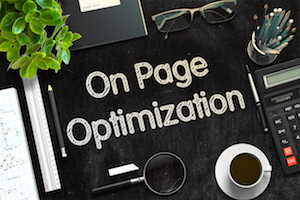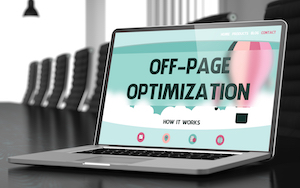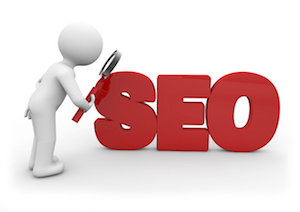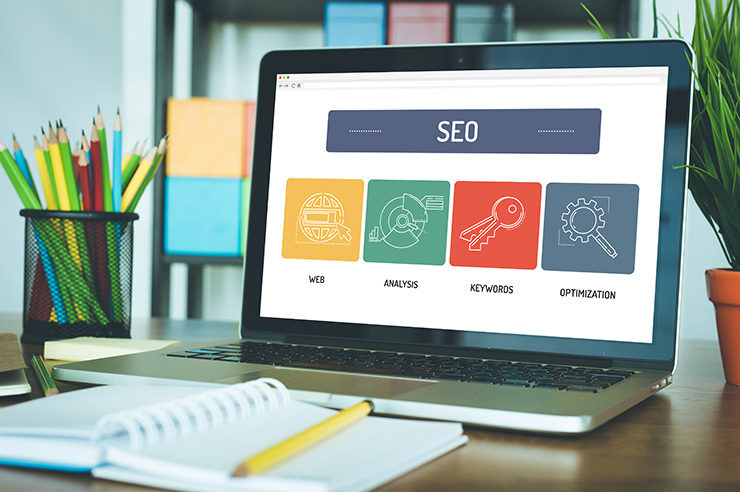While Search Engine Optimization (SEO) might sound quite simple, it is, in reality, quite complex. You must strategize. Research your keywords, competition, and new developments in the world of SEO. Google is continually updating and creating new search algorithms, so you have to pay attention, monitor, and adjust your strategy.
To maximize your exposure to search results and higher rankings, you’ll need to pay attention to two main components of SEO:
1. On-page or on-site SEO
2. Off-page or off-site SEO
Of course, focusing on one could get you on page 1, but it will only be temporary. You need one to support the other if you’re thinking long-term and, with SEO, you should. If you want to outrank your competition and stay there, you’ll need to understand both components – how they work and how to do it.
The Basics Of On-Page SEO
 Onsite SEO involves making the website more search engine friendly which means that you will have to adjust some elements on your site such that search engines can understand the content, as well as the structure of the website, helping you to get a better rank. You must know that your ranking depends on the data and information search engines can get from the website. So, the more information they can get, the more chances you have of ranking better in the index.
Onsite SEO involves making the website more search engine friendly which means that you will have to adjust some elements on your site such that search engines can understand the content, as well as the structure of the website, helping you to get a better rank. You must know that your ranking depends on the data and information search engines can get from the website. So, the more information they can get, the more chances you have of ranking better in the index.
To optimize your website for search engines, you’ll first need to work on fixing problems related to on-page SEO, such as:
- Using title tags that are focused on your keywords.
- Writing descriptive yet engaging meta descriptions.
- Making sure your blog posts and landing pages are at least 500 words to offer more value.
- Including semantic keywords, modifiers, and long-tail keywords in the title tags.
- Keeping your URLs logical, as well as clean and simple.
- Making sure your page title has 60 characters or less.
- Ensuring that the image file name includes the primary keywords.
- Mentioning your focus keywords in H1 and a few H2 tags.
- Making your social sharing buttons more prominent on your site.
The Basics Of Off-Page SEO
 While on-page SEO focuses on generating higher rankings, off-page SEO focuses on improving the flow of traffic coming to your website. For example, link building is crucial to getting high-quality backlinks, valuable traffic to your site, and improving your rankings with search engines. It’s a must-have aspect of your overall SEO strategy if you’re serious about your rankings.
While on-page SEO focuses on generating higher rankings, off-page SEO focuses on improving the flow of traffic coming to your website. For example, link building is crucial to getting high-quality backlinks, valuable traffic to your site, and improving your rankings with search engines. It’s a must-have aspect of your overall SEO strategy if you’re serious about your rankings.
Understanding off-page SEO gives you a significant advantage over your competitors – if you know what you’re doing. Here are some other off-page SEO also includes the following:
- Creating high-quality content that offers value to your target audience. Once you understand how various types of content can be used, you will be able to boost your SEO efforts thoroughly.
- Researching the type of audience viewing and making use of your content – and making sure it’s the right audience.
- Replicating good content and making it better.
- Commenting on popular forums, such as Reddit, and blogs to increase your reach.
- Leveraging the business relationships you have.
- Creating fantastic infographics.
- Writing for popular publications.
- Creating and distributing video content.
The Major Differences between On-Page & Off-Page SEO
 On-page SEO is the foundation for a website or blog that is looking for excellent search engine traffic – and it can be quite easy to do once you get the basics down. For instance, when coding in a blog post on your website, you can control your URLs, relevant keywords in both your content and meta and alt tags, as well as add any deep links to related content. Just make sure that your content is fully optimized for SEO, from heading structures to image size, before you hit publish.
On-page SEO is the foundation for a website or blog that is looking for excellent search engine traffic – and it can be quite easy to do once you get the basics down. For instance, when coding in a blog post on your website, you can control your URLs, relevant keywords in both your content and meta and alt tags, as well as add any deep links to related content. Just make sure that your content is fully optimized for SEO, from heading structures to image size, before you hit publish.
On the other hand, off-page SEO doesn’t offer as much control as on-page SEO. You can post links on social media, submit links to SEO-friendly websites, write guest posts on high-ranking sites and even boost your efforts through Paid Search and PPC campaigns. However, you won’t have the ability to tweak and adjust a page to be fully optimized for search engines, and you can’t control the sharing or trackbacks of your content.
Off-page and on-page SEO also differ in terms of the key factors or components involved.
Components of On-Page SEO
On-page SEO involves the following things:
-
- Web Content
Your website content is the most critical component of on-page SEO, and great importance should be given to its uniqueness and quality. Ideally, your content should not be duplicated anywhere on your site. Doing so will cause you to be penalized by search engines. Your content should also provide value to your audience and should captivate your audience. that it easily grabs attention.
-
- Meta Description
The meta description is a short overview of what the article is about. The content you place in these descriptions will be the same descriptions shown by search engines when your web pages show up in a search. Remember, meta descriptions greatly influence the decision of the user and can be the difference between them clicking on your content or not. Search engine crawlers also use it to rank your website for specific keywords.
-
- Rich Media File
A rich media file includes the relevant videos and photos on your web pages, adding value to your posts. Moreover, the relevancy of media files can also reinforce the assessment of the webpage done by the search engine. Just make sure your media files aren’t too large. Otherwise, they’ll slow down your site and upset not only your audience but search engines too.
-
- Internal Links
Proper placement of internal links is also important for on-page SEO optimization. Ideally, every page must link from either another page on your site or from the main page. Moreover, the structure of the internal links should also be flawless so visitors can quickly find pages that are relevant to their search.
-
- Domain Name
With Google’s recent EMD update, the domain name no longer plays a crucial role. However, the domain name does add relevancy and credibility to your website. It helps your audience identify if they’re on the right site related to their search.
-
- Other Components
Other components include the loading speed and the bounce rate. While both of them have only a little SEO value, they do enhance the user experience, thus leading to better page ranking. Since loading speed affects the bounce rate, it can force visitors to leave if it takes too long to load.
Components Of Off-Page SEO
As mentioned previously, off-page SEO involves optimization that takes place outside of your website. It doesn’t involve as many components as on-page SEO. However, it does require more effort and time.
The components of off-page SEO include:
-
- Link Building
Off-page SEO primarily revolves around link building. It enhances your SEO efforts by getting direct referrals to your site, thus, increasing targeted web traffic. To successfully build links to your website, you will need to write content that provides links to related content that offer value. Adding links with no content will harm your domain authority and rankings as search engines, such as Google, may mark them as spam. Make sure your content, such as guest posts, is on trustworthy websites with high domain authority.
-
- Reputation Management
While reputation management is not very well known, it is still quite significant. A trusted online reputation will benefit your SEO by improving the credibility among your audience – and with search engines. Following white-hat SEO methods will ensure all of your web optimization activities are within the legal bounds defined by Google. Choosing to take a black-hat SEO approach may give you quick search results, but once Google catches on, you can severely damage the reputation of your website, setting back your SEO efforts tremendously and creating more work for yourself in the future. Focus on obtaining good links from good sites. If you notice bad links, do your research and consider disavowing them.
-
- Social Media Engagement
Social media has become so popular these days that it has become one of the ranking parameters used by Google. Both the number of social likes and social signs are an indication of the rising popularity of web pages due to the value of the information present in the content. Therefore, increasing your social engagement also increases the ranking position of your site.
Summing It Up
Both on-page SEO and off-page SEO are crucial aspects of Search Engine Optimization and both need to be a part of your SEO strategy if you want to succeed. Once you’re at the top of SERPs, you will enjoy increased website traffic, conversions, and sales.
